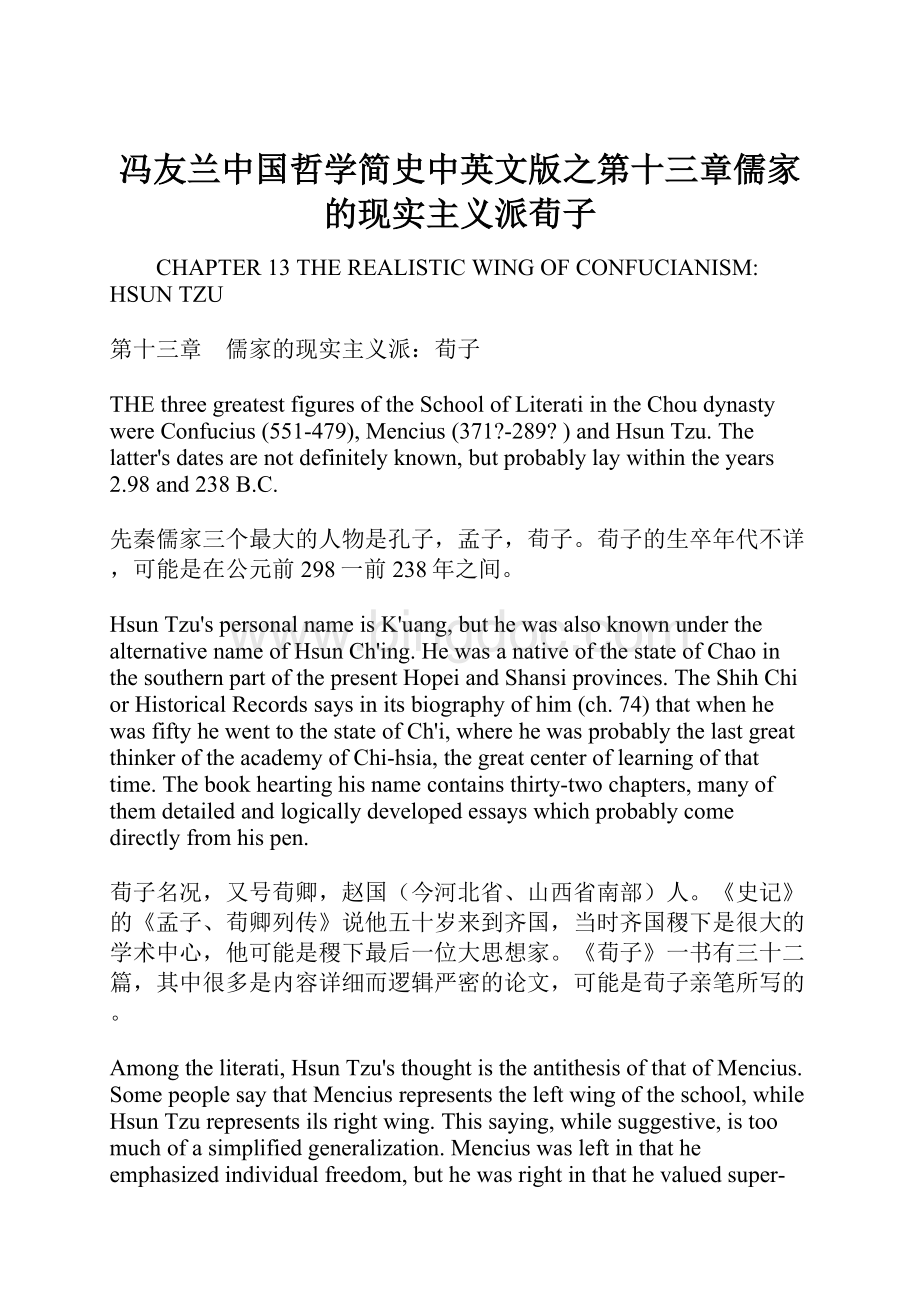冯友兰中国哲学简史中英文版之第十三章儒家的现实主义派荀子.docx
《冯友兰中国哲学简史中英文版之第十三章儒家的现实主义派荀子.docx》由会员分享,可在线阅读,更多相关《冯友兰中国哲学简史中英文版之第十三章儒家的现实主义派荀子.docx(19页珍藏版)》请在冰点文库上搜索。

冯友兰中国哲学简史中英文版之第十三章儒家的现实主义派荀子
CHAPTER13THEREALISTICWINGOFCONFUCIANISM:
HSUNTZU
第十三章 儒家的现实主义派:
荀子
THEthreegreatestfiguresoftheSchoolofLiteratiintheChoudynastywereConfucius(551-479),Mencius(371?
-289?
)andHsunTzu.Thelatter'sdatesarenotdefinitelyknown,butprobablylaywithintheyears2.98and238B.C.
先秦儒家三个最大的人物是孔子,孟子,荀子。
荀子的生卒年代不详,可能是在公元前298一前238年之间。
HsunTzu'spersonalnameisK'uang,buthewasalsoknownunderthealternativenameofHsunCh'ing.HewasanativeofthestateofChaointhesouthernpartofthepresentHopeiandShansiprovinces.TheShihChiorHistoricalRecordssaysinitsbiographyofhim(ch.74)thatwhenhewasfiftyhewenttothestateofCh'i,wherehewasprobablythelastgreatthinkeroftheacademyofChi-hsia,thegreatcenteroflearningofthattime.Thebookheartinghisnamecontainsthirty-twochapters,manyofthemdetailedandlogicallydevelopedessayswhichprobablycomedirectlyfromhispen.
荀子名况,又号荀卿,赵国(今河北省、山西省南部)人。
《史记》的《孟子、荀卿列传》说他五十岁来到齐国,当时齐国稷下是很大的学术中心,他可能是稷下最后一位大思想家。
《荀子》一书有三十二篇,其中很多是内容详细而逻辑严密的论文,可能是荀子亲笔所写的。
Amongtheliterati,HsunTzu'sthoughtistheantithesisofthatofMencius.SomepeoplesaythatMenciusrepresentstheleftwingoftheschool,whileHsunTzurepresentsilsrightwing.Thissaying,whilesuggestive,istoomuchofasimplifiedgeneralization.Menciuswasleftinthatheemphasizedindividualfreedom,buthewasrightinthathevaluedsuper-moralvaluesandthereforewasnearertoreligion.HsunTzuwasrightinthatheemphasizedsocialcontrol,butleftinthaiheexpoundednaturalismandthereforewasindirectoppositiontoanyreligiousideas.
儒家之中,荀子思想,是孟子思想的对立面。
有人说孟子代表儒家的左翼,荀子代表儒家的右翼。
这个说法,尽管很有道理,但是概括得过分简单化了。
孟子有左也有右:
左就左在强调个人自由;右就右在重视超道德的价值,因而接近宗教。
荀子有右也有左:
右就右在强调社会控制;左就左在发挥了自然主义,因而直接反对任何宗教观念。
PositionofMan
HsunTzuisbestknownbecauseofhistheorythathumannatureisoriginallyevil.ThisisdirectlyopposedtothatofMenciusaccordingtowhichhumannatureisoriginallygood.Superficially,ilmayseemthatHsunTzuhadaverylowopinionofman,yetthetruthisquitethecontrary.HsunTzu'sphilosophymaybecalledaphilosophyofculture.Hisgeneralthesisisthateverythingthatisgoodandvaluableistheproductofhumaneffort.Valuecomesfromcultureandcultureistheachievementofman.ItisinthisthatmanhasthesameimportanceintheuniverseasHeavenandEarth.AsHsunTzusays:
Heavenhasitsseasons,Earthhasitsresources,manhashisculture.Thisiswhatismeant[whenitissaidthatman]isabletoformatrinity[withHeavenandEarth]."(Hsun-tzu,ch.17.)
人的地位
荀子最著名的是他的性恶学说。
这与孟子的性善学说直接相反。
表面上看,似乎荀子低估了人,可是实际上恰好相反。
荀子的哲学可以说是教养的哲学。
他的总论点是,凡是善的、有价值的东西都是人努力的产物。
价值来自文化,文化是人的创造。
正是在这一点上,人在宇宙中与天地有同等的重要性。
正如荀子所说:
“天有其时,地有其财,人有其治,夫是谓之能参。
”(《荀子·天论》)
Menciussaidthatbydevelopingonesmindtotheutmost,oneknowsone'snature,andbyknowingone'snature,oneknowsHeaven.(Mencius,Vila,I.)Thus,accordingtoMencius,asage,inordertobecomeasage,must"knowHeaven."ButHsunTzumaintains,onthecontrary:
"ItisonlythesagewhodoesnotseektoknowHeaven."(Hsun-lzu,ch.17.)
孟子说:
“尽其心者,知其性也,知其性,则知天矣。
”(《孟子·尽心上》)可见在孟子看来,圣人要成为圣人,必须“知天”,但是荀子则相反,认为:
“唯圣人为不求知天”。
(《天论》)
AccordingtoHsunTzu,thethreepowersoftheuniverse,Heaven,Earthandman,eachhasitsownparticularvocation:
"Thestarsmaketheirrounds;thesunandmoonalternatelyshine;thefourseasonssucceedoneanother;theYinandYanggothroughtheirgreatmutations;windandrainarewidelydistributed;allthingsacquiretheirharmonyandhavetheirlives.(Ibid.)SuchisthevocationofHeavenandEarth.ButthevocationofmanistoutilizewhatisofferedbyHeavenandEarthandthuscreatehisownculture.HsunTzuasks:
IsitnotmuchbettertoheapupwealthanduseitadvantageouslythantoexaltHeavenandthinkaboutit?
(Ibid.)Andthenhecontinues:
IfweneglectwhatmancandoandthinkaboutHeaven,wefailtounderstandthenatureofthings.(Ibid.)Forinsodoing,accordingtoHsunTzu,manforgetshisownvocation;bydaringto"think"aboutHeaven,hearrogatesthevocationofHeaven.Thisis"togiveupthatwherewithmancanformatrinitywithHeavenandEarth,andyetstilldesiresuchatrinity.Thisisagreatillusion.(Ibid.)
荀子认为,宇宙的三种势力:
天、地、人,各有自己特殊的职责。
“列星随旋,日月递照,四时代御,阴阳大化,风雨博施,万物各得其和以生”(同上),这是天、地的职责。
但是人的职责是,利用天地提供的东西,以创造自己的文化。
荀子说:
“大天而思之,孰与物畜而制之!
”(同上)又说:
“故错(措)人而思天,则失万物之情。
”(同上)照荀子的说法,如果忽视人所能做的一切,就会忘记人的职责,如果敢于“思天”,就会冒充天履行天的职责。
这就是“舍其所以参,而愿其所参,则惑矣。
”(同上)
TheoryofHumanNature
Humannature,too,shouldbecultured,for,fromHsunTzusview,theveryfactthatitisunculturedmeansthatitcannotbegood.HsunTzu'sthesisisthatthenatureofmanisevil;hisgoodnessisacquiredtraining.(Hsiln-tzu,ch.2.3.)Accordingtohim,"natureistheunwroughtmaterialoftheoriginal;whatareacquiredaretheaccomplishmentsandrefinementsbroughtaboutbyculture.Withoutnaturetherewouldbenothinguponwhichtoaddtheacquired.Withouttheacquired,naturecouldnotbecomebeautifulofitself."(Ibid.)
人性的学说
人性也必须加以教养,因为照荀子所说,凡是没有经过教养的东西不会是善的。
荀子的论点是;“人之性,恶;其善者,伪也。
”(《荀子·性恶》)伪,就是人为。
照他看来,“性者,本始材朴也;伪者,文理隆盛也。
无性则伪之无所加;无伪则性不能自美。
”(《荀子·礼论》)
AlthoughHsunTzusviewofhumannatureistheexactoppositeofthatofMencius,heagreeswithhimthatitispossibleforeverymantobecomeasage,ifhechoose.MenciushadsaidthatanymancanbecomeaYaoorShun(twotraditionalsages).AndHsunTzusayslikewisethat"anymaninthestreetcanbecomeaYu[anothertraditionalsage]."(Ibid.)ThisagreementhasledsomepeopletosaythatthereisnorealdifferencebetweenthetwoConfucianistsafterall.Yetasamatteroffact,despitethisseemingagreement,thedifferenceisveryreal.
荀子的人性论虽然与孟子的刚好相反,可是他也同意:
人人能够成为圣人。
孟子说:
人皆可以为尧舜。
荀子也承认:
“涂之人可以为禹。
”(《荀子·性恶》)这种一致,使得有些人认为这两位儒家并无不同。
事实上不然,尽管这一点表面上相同,本质上大不相同。
AccordingtoMencus,manisbornwiththe"fourbeginningsofthefourconstantvirtues.Byfullydevelopingthesebeginnings,hebecomesasage.ButaccordingtoHsunTzu,manisnotonlybornwithoutanybeginningsofgoodness,but,onthecontrary,hasactual"beginnings'ofevilness.InthechaptertitledOntheEvilnessofHumanNature,HstinTzutriestoprovethatmanisbornwithinherentdesireforprofitandsensualpleasure.But,despitethesebeginningsofevilness,heassertsthatmanatthesametimepossessesintelligence,andthatthisintelligencemakesitpossibleforhimtobecomegood.Inhisownwords:
"Everymanonthestreethasthecapacityofknowinghuman-heartedness,righteousness,obediencetolawanduprightness,andthemeanstocarryouttheseprinciples.ThusitisevidentthathecanbecomeaYtt.(Ibid.)ThuswhereasMenciussaysthatanymancanbecomeaYaoorShun,becauseheisoriginallygood,HsunTzuarguesthatanymancanbecomeaYu,becauseheisoriginallyintelligent.
照孟子所说,仁、义、礼、智的“四端”是天生的,只要充分发展这四端,人就成为圣人。
但是照荀子所说,人不仅生来毫无善端,相反地倒是具有实际的恶端。
在《性恶》篇中,荀子企图证明,人生来就有求利求乐的欲望。
但是他也肯定,除了恶端,人同时还有智能,可以使人向善。
用他自己的话说:
“涂之人也。
皆有可以知仁、义、法、正之质,皆有可以能仁、义、法、正之具,然则其可以为禹,明矣。
”(《性恶》)可见,孟子说人皆可以为尧舜,是因为人本来是善的;荀子论证涂之人可以为禹,是因为人本来是智的。
OriginofMorality
Thisleadstothequestion:
How,then,canmanbecomemorallygood?
Forifeverymanisbornevil,whatistheoriginofgood?
Toanswerthisquestion,HsunTzuofferstwolinesofargument.
道德的起源
这就引起一个问题:
既然如此,人在道德方面如何能善?
因为,每个人如果生来就是恶的,那么,道德又起源于什么呢?
为了回答这个问题,荀子提出了两个方面的论证。
Inthefirstplace,HsunTzumaintainsthatmencannotlivewithoutsomekindofasocialorganization.Thereasonforthisisthat,inordertoenjoybetterliving,menhaveneedofco-operationandmutualsupport.HsunTzusays:
Asingleindividualneedsthesupportoftheaccomplishmentsofhundredsofworkmen.Yetanablemancannotbeskilledinmorethanoneline,andonemancannotholdtwoofficessimultaneously.Ifpeoplealllivealoneanddonotserveoneanother,therewillbepoverty.(Ch.10.)Likewise,menneedtobeunitedinordertoconquerothercreatures:
"Man'sstrengthisnotequaltothatoftheox;hisrunningisnotequaltothatofthehorse;andyetoxandhorseareusedbyhim.Howisthis?
Isaythatitisbecausemenareabletoformsocialorganizations,whereastheothersareunable....Whenunited,menhavegreaterstrength;havinggreaterstrength,theybecomepowerful;beingpowerful,theycanovercomeothercreatures.(Ibid.)
第一个方面,荀子指出,人们不可能没有某种社会组织而生活。
这是因为,人们要生活得好些,有必要合作互助。
荀子说:
“百技所成,所以养一人也。
而能不能兼技,人不能兼官,离居不相待则穷:
”(《荀子·富国》)还因为,人们需要联合起来,才能制服其他动物。
人“力不若牛,走不若马,而牛马为用,何也?
曰:
人能群,彼不能群也。
……一则多力,多力则强,强则胜物。
”(《荀子·王制》)
Forthesetworeasons,menmusthaveasocialorganization.Andinordertohaveasocialorganization,theyneedrulesofconduct.ThesearetheIi(rites,ceremonies,customaryrulesofliving)whichholdanimportantplaceinConfucianismgenerally,andarcespeciallyemphasizedbyHsunTzu.Speakingabouttheoriginoftheli,hesays:
"Whencedotheliarise?
Theansweristhatmanisbornwithdesires.Whenthesedesiresarenotsatisfied,hecannotremainwithoutseekingtheirsatisfaction.Whenthisseekingforsatisfactioniswithoutmeasureorlimit,therecanonlybecontention.Whenthereiscontention,therewillbedisorder.Whenthereisdisorder,everythingwillbefinished.Theearlykingshatedthisdisorder,andsotheyestablishedtheli[rulesofconduct]andyi[righteousness,moralityJ,tosetanendtothisconfusion.'(Ch.19.)
由于这两种原因,人们一定要有社会组织。
为了有社会组织、人们需要行为的规则。
这就是“礼”。
儒家一般都重视礼,荀子则特别强调礼。
讲到礼的起源,荀子说:
“礼起于何也?
曰:
人生而有欲,欲而不得,则不能无求,求而无度量分界,则不能不争。
争则乱,乱则穷。
先王恶其乱也,故制礼义以分之,以养人之欲,给人之求,使欲必不穷乎物,物必不屈于欲,两者相持而长,是礼之所起也。
”(《荀子·礼论》)
Inanotherchapter,HsunTzuwrites:
'Peopledesireandhalethesamethings.Theirdesiresaremany,butthingsarefew.Sincetheyarefewtherewillinevitablybestrife."(Ch.10.)HsunTzu,